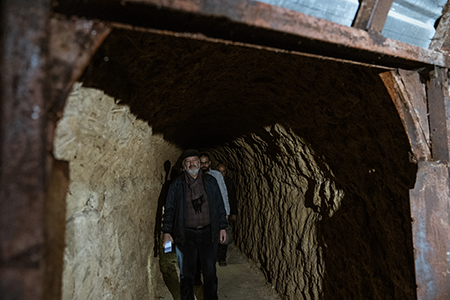"[Arms Control Today] has become indispensable! I think it is the combination of the critical period we are in and the quality of the product. I found myself reading the May issue from cover to cover."
Fate of Syrian Chemical Weapons Uncertain After Assad’s Fall
January/February 2025
By Mina Rozei
International experts have stepped up their monitoring of chemical weapons stockpiles in Syria since the overthrow of President Bashar Assad, but there is much uncertainty about the status of the program and possible contamination due to strikes on military facilities there, according to UN and U.S. officials.

At an emergency meeting of the Executive Council of the Organisation for the Prohibition of Chemical Weapons (OPCW) on Dec. 12, Director-General Fernando Arias reported on “airstrikes targeting military facilities” after Assad was ousted four days earlier by Syrian rebels and fled to Moscow.
“We do not know yet whether these strikes have affected chemical weapons-related sites,” but they “could create a risk of contamination,” Arias said. Multiple news media reported that the Israel Defense Forces began a bombing campaign that included suspected chemical storage sites almost immediately after Assad was ousted.
Arias noted that Syria’s political and security situation “remains volatile.” He warned that attacks on chemical sites also could risk “the destruction of valuable evidence” needed for investigations by various independent international bodies probing the Assad regime’s use of chemical weapons and risk “dangerous chemicals or equipment being lost, without any control.”
Along with the OPCW, the United States has been waiting to see if remnants of the Assad regime’s chemical weapons stockpiles would be found, but The New York Times reported on Dec. 25 that “none are known to have turned up so far.”
In a speech on Dec. 19, U.S. Deputy National Security Advisor John Finer said that the United States was making the future of the Syrian chemical stockpile a priority after Assad’s fall and would work with the OPCW and states in the region to find, secure, and dispose of any remaining chemical weapons stockpiles.
He also said that the United States understands that the Syrian rebel group Hayat Tahrir al-Sham (HTS) and the caretaker government in Damascus are committed to recovering and disposing of chemical stockpiles and that Washington has encouraged them to do so.
The fall of the Assad regime raises important questions about the remainder of Syria’s chemical weapons stockpile.
For 11 years, the OPCW has worked to persuade Syria to fulfill its obligations under the Chemical Weapons Convention (CWC) by coming clean about its chemical weapons program and destroying all components. Instead, the Syrian government obfuscated and delayed releasing a full report of its chemical program.
Arias said that, since Assad’s ouster, the OPCW has heard “positive signals from within Syria” on the need to rid the country of chemical weapons but “to date, we have not received any official request for help from any Syrian authorities.”
In a Dec. 9 statement, the OPCW “reaffirm[ed] its commitment to clarifying gaps, discrepancies, and inconsistencies in Syrian chemical weapons declarations amidst [the] political transition.” The statement said that the OPCW Technical Secretariat communicated with the Syrians to “ensur[e] the safety and security of all chemical weapons[-]related materials and facilities at all locations on [Syrian] territory.”
At high-level meetings since 2022, top UN disarmament officials bemoaned the “gaps, inconsistencies, and discrepancies” in Syria’s declaration regarding its use of chemical weapons, which the United Nations considered incomplete and not in accordance with the CWC.
Syria acceded to the CWC in September 2013 after allegations of chemical weapons use by the Assad government. The Technical Secretariat formed the Declaration Assessment Team in 2014, when Syria first submitted its declaration to the OPCW. The OPCW repeatedly has questioned the accuracy and completeness of the declaration, stalling the verification of Syria’s chemical weapons stockpile and its eventual destruction.
The OPCW confirmed that there were 'reasonable grounds' to believe that the Syrian military used chemical weapons on Douma in 2018. (See ACT, March 2023.)
The OPCW also confirmed the use of chemical weapons by nonstate actors in 2015. Numerous other cases of chemical attacks took place during the Syrian civil war in 2013-2024, but no perpetrator has been determined. (See ACT, April 2024)
